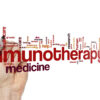When Chris Joseph’s oncologist prescribed chemotherapy to tackle pancreatic cancer in 2016, he says the drug made him miserable and didn’t address his cancer. “I quit. I had no Plan B, but I just didn’t want to die of chemo,” he adds. Plus, “it wasn’t helping my cancer: my tumor was still growing.” Today, he is taking pembrolizumab (Keytruda), a drug that helps his own immune system fight the cancer. His tumor has shrunk considerably, and his doctors have told him that as long as it doesn’t grow, he can live with the cancer. His story is a common one. Stephanie, a Stage 4 endometrial cancer patient had a similar experience, starting with chemotherapy then moving on to immunotherapy side effects. “In my case, immunotherapy has been life-saving,” she says.
While immunotherapeutic treatments often produce fewer and less intense side effects than other cancer treatments like chemotherapy and radiation, the side effects they do cause are very different. Rather than being triggered by a chemical in the drug, the side effects of immunotherapy tend to be caused by your own immune system attacking your body. If you have an autoimmune disease, too, like irritable bowel syndrome or multiple sclerosis, the immunotherapy drugs can cause flare-ups.
The worst side effects of immunotherapy like inflammation of the heart and lungs, can be both unpredictable and fatal. You can develop side effects at any point during treatment and even afterward, whether or not you have an autoimmune disease. Experts emphasize the importance of telling your care team immediately about any side effects, because the sooner they’re addressed, the less dangerous they may be.
Types of Immunotherapies
There main categories of immunotherapeutic drugs for cancer treatment are: immunomodulators, targeted antibodies, cell therapies and cancer vaccines. Each uses different routes, but in one way or another all empower your immune system to fight cancer cells. In doing so, the drug can cause your immune system to fight your own cells as well.
Immunomodulators
Immunomodulators make up a broad category of immunotherapies that target molecular pathways that control your immune response. One reason that cancer can be so detrimental is that cancer cells send out signals that trick your immune system into leaving them alone. Some types of immunomodulators, like the one Joseph was prescribed, are checkpoint inhibitors, which block these signals so that your immune system starts fighting again. Others, like interferon and interleukin, stimulate the growth and activation of more immune cells to beef up your immune army.
Some immunomodulators are:
Checkpoint Inhibitors
- atezolizumab (Tecentriq)
- avelumab (Bavencio)
- cemiplimab (Libtayo)
- durvalumab (Imfinzi)
- Ipilimumab (Yervoy)
- nivolumab (Opdivo)
- pembrolizumab (Keytruda)
Cytokines
- aldesleukin (Proleukin)
- granulocyte-macrophage colony-stimulating factor (GM-CSF)
- interferon alfa-2a (Roferon-A)
- interferon alfa-2b (Intron A)
- peginterferon alfa-2b (Sylatron/PEG-Intron)
Other Immune Modulators
- imiquimod (Aldara)
- poly ICLC (Hiltonol)
- pexidartinib (Turalio)
Side Effects
Oncologist Kevin Knopf explains that older immunotherapies like interferon and interleukin are less targeted than newer checkpoint inhibitor therapies. These early treatments are more likely to cause widespread side effects that can affect your whole body.
Of the newer checkpoint inhibitors, Knopf says that CTLA4 inhibitors like ipilimumab (Yervoy), commonly used for melanoma, can cause dangerous diarrhea. “If you have diarrhea, we have this whole algorithm that we teach the patients,” he says. “They start taking Imodium [loperamide] to slow down the bowel movement, and they drink fluids. If it’s bad, sometimes they need to come into the clinic for IV fluids. If it gets worse, we have other treatments for them, like steroids, to dampen the immune system.”
For Joseph, the side effects of checkpoint immunotherapy have been limited to itchy skin and an increased concentration of thyroid hormones, which showed up on blood tests. Other side effects include rashes and fatigue. However, the most troubling are the “itises,” says Knopf, conditions caused by severe inflammation to different organs, like hepatitis (liver), myocarditis (heart) and nephritis (kidney. Immunotherapy can cause inflammation to any organ, with varying symptoms and degrees of severity.
Because the side effects can be really unpredictable, Knopf adds, “We monitor [patients’] blood tests. We get like thyroid functions and cortisol levels. We tell them if anything seems abnormal, please call us right away. [Among the possible symptoms are:] chest pain, shortness of breath, suddenly feeling tired.”
Targeted Antibodies
Antibodies are small molecules that your body produces to recognize infections or cancer cells. Each type of antibody only responds to a specific marker or antigen. A cancer cell may have many different antigens on the outside. An antibody will recognize one of these antigens and bind to it, essentially waving a flag that says, “Over here, guys! I found the invader!” to your other immune cells. Some cancer cells change to hide certain antigens, rendering antibodies that recognize them useless. Scientists can use targeted antibodies created in the lab that can recognize different antigens on the outside of your cancer cells, so that they can better direct your immune response.
The antibody variety depends on the type of cancer and, oftentimes, the specific genotypes of your cancer cells. Some antibodies do more than just alert your immune system to the cancer; they can deliver anticancer drugs directly to your cancer cells or bind both your immune and cancer cells to bring the “soldiers” in to fight more quickly.
Antibody therapies are:
- alemtuzumab (Campath)
- bevacizumab (Avastin)
- cetuximab (Erbitux)
- daratumumab (Darzalex)
- denosumab (Xgeva)
- dinutuximab (Unituxin)
- elotuzumab (Empliciti)
- isatuximab (Sarclisa)
- mogamulizumab (Poteligeo)
- naxitamab-gkgk (Danyelza)
- necitumumab (Portrazza)
- obinutuzumab (Gazyva)
- ofatumumab (Arzerra)
- olaratumumab (Lartruvo)
- panitumumab (Vectibix)
- pertuzumab (Perjeta)
- ramucirumab (Cyramza)
- rituximab (Rituxan)
- tafasitamab (Monjuvi)
- trastuzumab (Herceptin)
- belantamab mafodotin-blmf (Blenrep)
- brentuximab vedotin (Adcetris)
- enfortumab vedotin (Padcev)
- gemtuzumab ozogamicin (MyloTarg)
- ibritumomab tiuxetan (Zevalin)
- inotuzumab ozogamicin (Besponsa)
- moxetumomab pasudotox (Lumoxiti)
- polatuzumab vedotin (Polivy)
- sacituzumab govitecan-hziy (Trodelvy)
- trastuzumab deruxtecan (Enhertu)
- trastuzumab emtansine (Kadcyla)
- blinatumomab (Blincyto)
Side Effects
Antibodies are designed to target your cancer cells, but the antigens they recognize may also be present on healthy cells in your body. If this is the case, antibodies attach to those cells as well and cause your immune system to attack them. Like other immunotherapies, the symptoms depend on which of your cells are attacked. Crucial is vigilance and open communication with your medical team about any changes.
Possible side effects include:
anemia
constipation
cough
gastrointestinal (GI) symptoms
headache
infusion site reactions
pain
itchy skin
low white blood cell counts
Cell Therapy
In cell therapy, scientists actually remove certain immune cells from your body and modify them. This allows the treatment to better identify and kill cancer cells before infusing them back into your body.
Cellular therapies can be “associated with a cytokine release storm (CRS), a general hyperactivation of the immune system with release of large amounts of inflammatory cytokines,” explains Emma Shtivelman, PhD, chief scientist at Cancer Commons. While cytokine storms can cause severe damage, she emphasizes that “there are various ways to prevent CRS and treat it, if it develops.” Some experts say flu-like symptoms caused by a CRS can occur in up to 70 to 90% of patients for short amounts of time.
While many cellular therapies are in clinical trials, only a handful are Food and Drug Administration-approved (FDA) to treat lymphoma and leukemia. They include:
- axicabtagene ciloleucel (Yescarta)
- brexucabtagene autoleucel (Tecartus)
- lisocabtagene maraleucel (Breyanzi)
- tisagenlecleucel (Kyrmriah)
Along with cytokine storms, side effects may include:
neurological symptoms, like dizziness and delirium
GI symptoms
fever
headaches
tremors
low blood pressure
heart rhythm changes (arrhythmia or faster heart rate)
Cancer Vaccines
Therapeutic cancer vaccines work differently than the vaccines most of us are familiar with. Like most vaccines, those treating cancer are designed to elicit immune responses, but the main difference between traditional vaccines and therapeutic cancer ones is that cancer vaccines are not preventative. They help your immune system recognize and attack a disease that is already there, whereas most other vaccines help prepare your body for a possible future infection. Two vaccines have been approved to treat cancers, and each works differently.
The first is Bacillus Calmette-Guérin, (TheraCys, TICE BCG). This vaccine injects weakened bacteria near the tumor, which won’t make a patient sick, to stimulate an immune response. As immune cells flock to the bacteria, they also attack the tumor. The second is sipuleucel-T (Provenge), which is used to treat prostate cancer. This injection is similar to cellular therapy; scientists extract some of your dendritic cells (types of immune cells) and engineer them to better attack the cancer before they inject them back into you.
Like other immunotherapies, most side effects are caused by your immune system attacking healthy cells.
Some side effects include:
fatigue
fever
aches and pains
nausea
nerve damage
Palliative Care
Unfortunately, there isn’t much you can do on your own to handle immunotherapy side effects. “There is no proven way to ameliorate the autoimmune side effects of cancer immunotherapy, without resorting to treatment interruption or use of certain drugs,mainly steroids or other anti-inflammatory drugs,” says Shtivelman. It’s crucial to keep your medical team in the loop because even mild symptoms can grow into something dangerous.
Recently, palliative care has taken on a more integrative role in cancer treatment. At many cancer treatment centers, for instance, palliative care specialists join a patient’s medical team from the beginning. These specialists emphasize that palliative care is not simply defined as end-of-life care, but care that focuses on your comfort and can help monitor and manage treatment side effects or even complicated feelings of anxiety and depression that may come with a cancer diagnosis. Palliative care teams can include physicians, nurses, occupational and physical therapists, social workers and others. Many patients who receive palliative care report a better quality of life during treatment. Authors of a 2019 article in JAMA Oncology write, “Sometimes the burden of the disease is high and requires more time and skill than an oncologist can provide. Palliative care specialists can step in and use their expertise to help manage distressing symptoms and provide emotional support.”
Despite the dangers of immunotherapies, many patients report fewer side effects than from other types of cancer treatments. Michele Nachum, now three years into remission from Hodgkin’s lymphoma, says that when chemotherapy killed only one of her two tumors, she faced a choice. She could undergo a much more intense three-day chemotherapy regimen or she could try immunotherapy. “I opted for immunotherapy first, knowing that the treatment has very few side effects. I wouldn’t lose my hair (again) or have my immune system wiped out,” she says. “[The drug] Opdivo was amazing. After three weeks of the treatment, I [had] a PET scan, and my doctor called me with the first piece of good news in a long while: the tumor was finally shrinking. A month later, I was in remission.There were no side effects that I could ascertain. I didn’t lose my immune system or my hair. I could work, travel and be a mom.”






